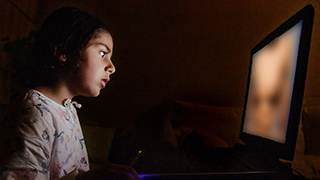Children at risk online due to 'irresponsible' parenting

A government spokeswoman has warned that "wholly irresponsible" adults are leaving children to "fend for themselves" online.
Anne Longfield, the Children's Commissioner for England, spoke out after publishing the results of a year-long study into children's online usage, which found that children are being bullied and groomed by abusers on the internet.
In response to the findings, Ms Longfield is calling for a compulsory "digital citizenship" curriculum in schools, which would educate children about online safety.
Christian Concern's Chief Executive, Andrea Williams, said that parents should take more responsibility for how children spend their time online.
1 in 3 teenagers send explicit photos
The study, 'Growing Up Digital', found that children are now spending half their leisure time on the internet, with three and four year old children exposed to small screens for an average of eight hours 18 minutes per week.
It points to earlier research suggesting that one in three teenagers are sharing explicit photos of themselves online, and cites examples of digital stalkers who pressure youngsters to share sexually explicit pictures of themselves. This sometimes occurs even after the stalkers have been reported to social media providers.
Children were also shown to be unwittingly giving companies the rights to pictures and other personal information, through agreeing to unclear terms and conditions on social media websites.
Parents unaware of dangers
Ms Longfield said: "The internet is an incredible force for good but it is wholly irresponsible to let them roam in a world for which they are ill-prepared, which is subject to limited regulation and which is controlled by a small number of powerful organisations."
She continued by highlighting how parents do not fully understand the dangers that they are subjecting their children to: "Children are in a largely disorganised environment which was never developed for children even though children are among the biggest users.
"As parents we would all be very worried if our children were going out by themselves into an environment where they didn't know where they were; we would be worried if we were taking our children and dropping them off at nine o'clock at night [and didn't know where they were going].
"But actually this is a new context where parents don't know where they are."
'Digital citizenship'
Ms Longfield said that she hoped the government would extend the power of the Children's Commissioner's office, to give it independent oversight of the number and type of complaints that social media providers are receiving from children and teenagers.
She also believes that introducing compulsory "digital citizenship" lessons in every school from ages four to 14 would improve the situation.
"It is critical that children are educated better so that they can enjoy the opportunities provided by the internet whilst minimising the well-known risks," she said.
"Parents are always going to be on a losing battle which is why we need to take greater action to shift the balance of power towards children," she added.
Need for clear communication with parents
But Andrea Williams commented:
"It is encouraging that our society is waking up to the dangers children are facing online. But parents should be primarily responsible for their children's internet access," she said. "We should be encouraging parents to communicate clearly with their children so they are aware of what kind of content they are coming across, and if necessary restrictions should be put in place.
"Simply teaching online safety in schools is an inadequate response and will not lessen the dangers they are subjected to."
Related links:
One in three children send naked selfies online because parents let them 'roam free' on the internet (Telegraph)
Online safety: Internet 'not designed for children' (BBC)
'Growing Up Digital' - A report of the growing up digital taskforce (Gov UK)
